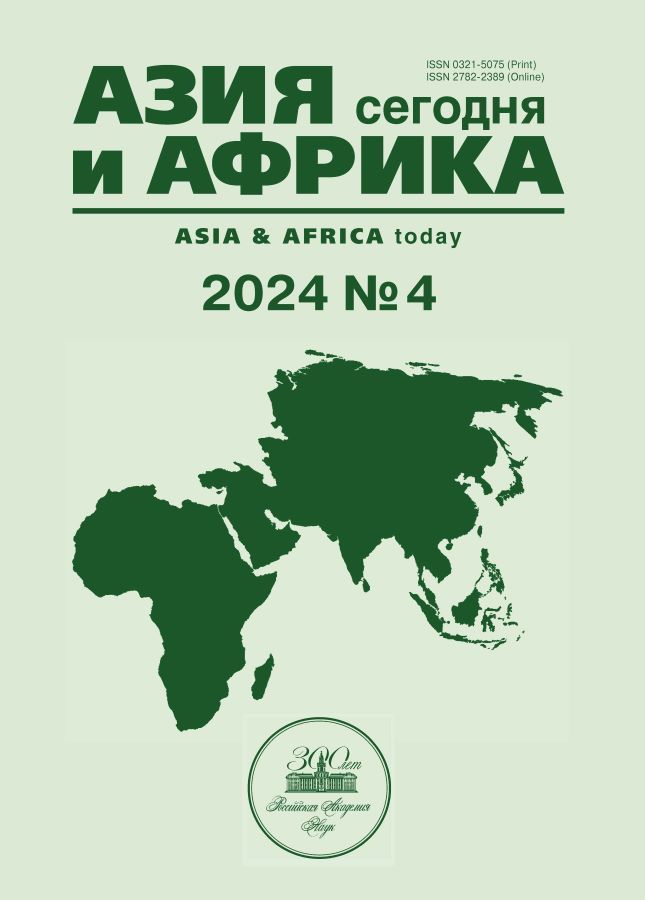New Initiatives within Chinese “Soft Power”
- Authors: Sergeeva А.А1
-
Affiliations:
- Institute of Asian and African Studies, Lomonosov Moscow State University
- Issue: No 4 (2024)
- Pages: 47-53
- Section: Politics, economics
- URL: https://rjmseer.com/0321-5075/article/view/647412
- DOI: https://doi.org/10.31857/S032150750028802-4
- ID: 647412
Cite item
Abstract
The article is devoted to a new initiative of the Chinese government – the establishment of Luban workshops – a system of workshops where future specialists are trained in production automation and even traditional Chinese medicine. The author explores the history of the organization of workshops in different countries, their characteristics and peculiarities. This initiative can be considered as a new tool of “soft power”, which appeared in response to criticism and opposition to the development of the network of Confucius Institutes and other humanitarian-educational projects. Under the national global infrastructure development strategy adopted by the Chinese government in 2013, the Belt and Road Initiative, Beijing is gradually laying the foundations of its new international order and shaping its institutions beyond its borders in its own image. It can be said that this Chinese brand has also made a significant contribution to the development of international co-operation in professional culture and education.
About the authors
А. А Sergeeva
Institute of Asian and African Studies, Lomonosov Moscow State University
Email: unanimity-sa@hotmail.com
ORCID iD: 0009-0006-3384-6557
PhD (Political Science), Senior Researcher Moscow, Russia
References
- 黑龙江农业工程职业学院与俄罗斯滨海边疆区居民职业教育和就业部签约共建鲁班工坊。(An agreement on cooperation within the framework of the Lu Banya Workshops project was signed between the Heilongjiang Agricultural Engineering Professional Academy and the Ministry of Vocational Education and Employment of the Primorsky Krai). (In Chin.). https://t.m.youth.cn/transfer/index/url/df.youth.cn/dfzl/202401/t20240127_150476 39.htm (accessed 07.01.2024)
- Irwandi J., Mahtani Shi. Winning friends by training workers in China’s new gambit. The Washington Post. 10.07.2024.
- Kley D., Yau N. China’s Global Network of Vocational Colleges to Train the World. The Diplomat. 11.11.2021. https://thediplomat.com/2021/11/chinas-global-network-of-vocational-colleges-to-train-the-world/ (accessed 16.10.2023)
- Li X. China’s Luban Workshop creates a pool of skilled workers for developing countries, injects vitality into local economies. Global Times. 20.08.2022. https://globaltimes.cn/page/202208/1273435.shtml (accessed 08.05.2023)
- Ван Б., Мартынова Н.В. Профессиональные мастерские «Lu Ban workshop» как пример успешного опыта международного сотрудничества Китая в рамках национальной инициативы «Один пояс – один путь». https://cyberleninka.ru/article/n/professionalnye-masterskie-lu-ban-workshop-kak-primer-uspeshnogo-opyta-mezhdunarodnogo-sotrudnichestva-kitaya-v-ramkah-natsionalnoy/viewer (accessed 03.04.2023). doi: 10.5281/zenodo. 6616168 Wang B., Martynova N.V. Professional workshop “Lu Ban” as an example of China’s successful international cooperation in the national Belt and Road Initiative. https://cyberleninka.ru/article/n/professionalnye-masterskie-luban-workshop-kak-primer-uspeshnogo-opyta-mezhdunarodnogo-sotrudnichestva-kitaya-v-ramkahnatsionalnoy/viewer (accessed 03.04.2023). doi: 10.5281/zenodo.6616168
- Сергеева А.А. Новые инициативы в рамках «мягкой силы» КНР. Ломоносовские чтения. Востоковедение и африканистика. Материалы научной конференции. Москва. 2022. С. 194–195. https://iaas.msu.ru/wp-content/uploads/2022/05/lomo2022.pdf (accessed 01.10.2023) Sergeeva А.А. 2022. New initiatives within Chinese “soft power”. (In Russ.). Lomonosov. Oriental and African Studies. Scientific conference materials. Moscow. С. 194–195. https://iaas.msu.ru/wp-content/uploads/2022/05/lomo2022.pdf (accessed 01.10.2023)
Supplementary files










